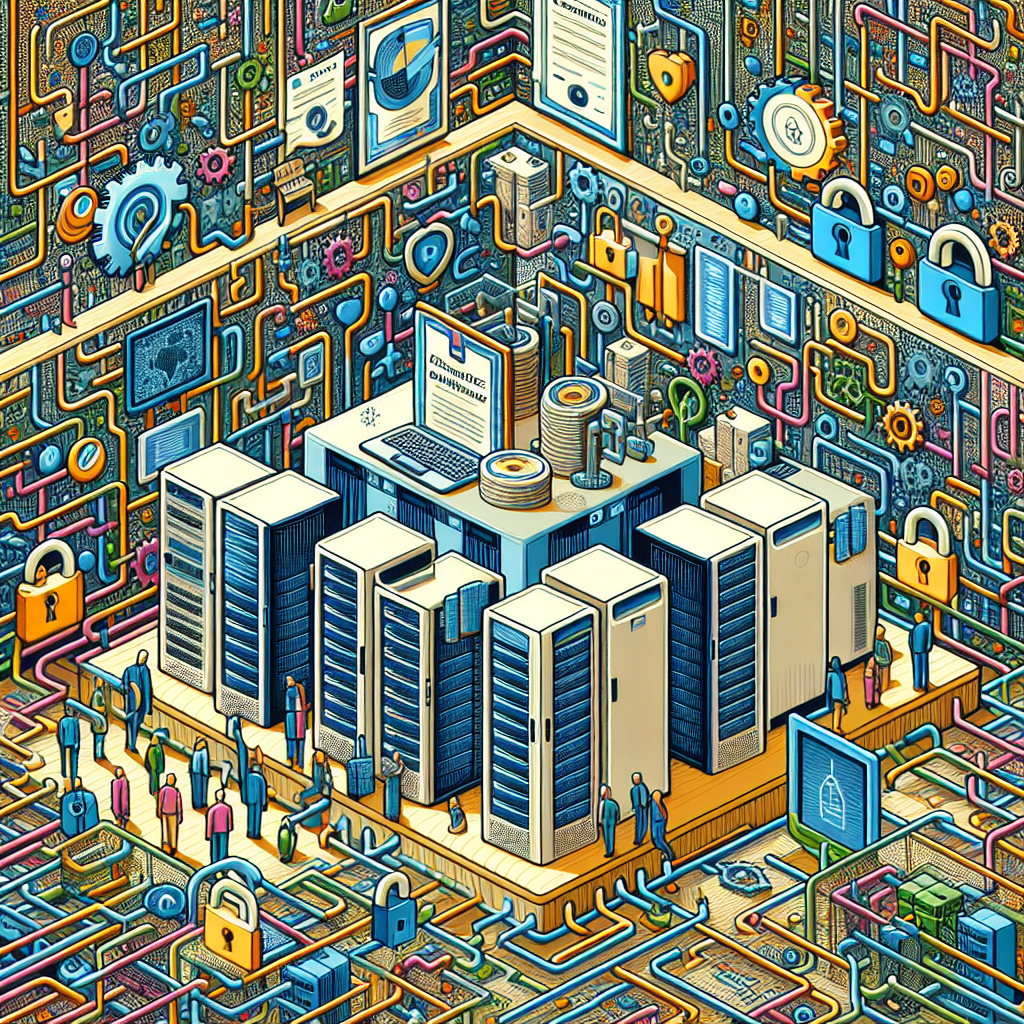Your cart is currently empty!
Tag: World

Navigating the Complex World of Data Center Compliance: A Guide for Businesses
In today’s digital age, data centers play a crucial role in storing and managing vast amounts of information for businesses. However, with this increased reliance on data centers comes the need for businesses to navigate the complex world of data center compliance. From ensuring data security to meeting regulatory requirements, businesses must take proactive steps to protect their data and maintain compliance with industry standards.Data center compliance refers to the process of adhering to regulations and guidelines that govern the storage, processing, and transmission of data. This includes maintaining the security and privacy of sensitive information, as well as meeting industry-specific standards such as HIPAA for healthcare organizations or PCI DSS for businesses that handle credit card transactions.
One of the key challenges businesses face when it comes to data center compliance is the ever-evolving nature of regulations and standards. As technology advances and new threats emerge, businesses must stay abreast of changes in compliance requirements and ensure their data center practices are up to date.
To navigate the complex world of data center compliance, businesses can follow these key steps:
1. Conduct a risk assessment: Start by identifying the types of data your business stores and the potential risks associated with that data. This will help you prioritize security measures and compliance efforts.
2. Implement security controls: Put in place appropriate security controls to protect your data, such as encryption, access controls, and monitoring systems. Regularly assess and update these controls to address new threats.
3. Train employees: Educate your staff on data security best practices and compliance requirements. Employees play a critical role in maintaining data center compliance, so it’s important to ensure they understand their responsibilities.
4. Monitor and audit: Regularly monitor your data center processes and conduct audits to ensure compliance with regulations and standards. This will help you identify any gaps or vulnerabilities that need to be addressed.
5. Stay informed: Keep up to date with changes in data center compliance regulations and industry standards. Join industry groups, attend conferences, and engage with experts to stay informed on best practices and emerging trends.
By following these steps, businesses can navigate the complex world of data center compliance and protect their data from potential security breaches and regulatory violations. Investing in robust data center compliance practices not only helps safeguard sensitive information but also enhances trust with customers and partners. In today’s data-driven world, compliance is not just a legal requirement – it’s a business imperative.

The Importance of Data Center Databases in Today’s Digital World
In today’s digital age, data is king. From social media platforms to e-commerce websites, every aspect of our lives is stored and analyzed in vast databases. This data is crucial for businesses to make informed decisions, personalize user experiences, and drive growth. And at the heart of these databases are data center databases.Data center databases are the backbone of modern businesses. They store, organize, and manage vast amounts of information, from customer profiles to financial records. Without these databases, businesses would struggle to keep track of their data, leading to inefficiencies, errors, and missed opportunities.
One of the key reasons why data center databases are so important is their ability to handle massive amounts of data. In today’s digital world, businesses collect and generate data at an unprecedented rate. From website traffic to sales transactions, the volume of data being generated is staggering. Data center databases can efficiently store and process this data, ensuring that businesses can access and analyze it in real-time.
Furthermore, data center databases play a crucial role in data security. With cyber threats on the rise, businesses need to ensure that their data is protected from unauthorized access and breaches. Data center databases have built-in security features, such as encryption and access controls, to safeguard sensitive information. By storing data in a centralized location, businesses can also ensure data integrity and consistency across their organization.
Moreover, data center databases enable businesses to extract valuable insights from their data. By analyzing trends, patterns, and correlations, businesses can uncover hidden opportunities and make data-driven decisions. This not only enhances operational efficiency but also enables businesses to stay ahead of the competition.
In conclusion, data center databases are essential in today’s digital world. They provide businesses with the infrastructure needed to store, manage, and analyze vast amounts of data. By ensuring data security, enabling real-time access, and facilitating data-driven decision-making, data center databases empower businesses to thrive in the digital age. As data continues to be the driving force behind business success, investing in robust data center databases is crucial for long-term growth and sustainability.

The Importance of Data Center Servers in Today’s Digital World
In today’s digital world, data center servers play a crucial role in storing, processing, and managing the vast amounts of data that businesses and individuals generate every day. These servers are the backbone of the internet and are essential for ensuring that websites, applications, and services run smoothly and efficiently.Data center servers are powerful computers that are designed to handle the heavy workload of processing and storing data. They are housed in specialized facilities known as data centers, which are equipped with cooling systems, backup power supplies, and security measures to ensure that the servers operate at optimal levels.
The importance of data center servers cannot be overstated, as they are responsible for handling a wide range of tasks, including hosting websites, running applications, and storing critical business data. Without reliable servers, businesses would not be able to operate effectively, and individuals would not be able to access the services and information they need.
One of the key benefits of data center servers is their ability to scale and accommodate growing data needs. As businesses and individuals generate more data, data center servers can be easily upgraded or expanded to handle the increased workload. This scalability is essential for ensuring that businesses can continue to grow and thrive in today’s digital economy.
Data center servers also play a critical role in ensuring data security and reliability. By storing data in secure, redundant servers, businesses can protect their sensitive information from cyber threats and ensure that it is always available when needed. This level of security and reliability is essential for maintaining the trust of customers and partners.
In addition to storing and processing data, data center servers also play a key role in enabling cloud computing services. Cloud computing allows businesses to access computing resources and applications over the internet, without the need for on-site servers. This flexibility and scalability are essential for businesses looking to adapt to changing market conditions and customer demands.
Overall, data center servers are essential for powering the digital economy and enabling businesses and individuals to access the information and services they need. Without these servers, the internet as we know it would not be possible, and businesses would not be able to compete in today’s fast-paced, data-driven world. As the demand for data continues to grow, the importance of data center servers will only continue to increase, making them a vital component of today’s digital infrastructure.
